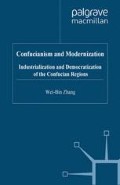Abstract
Immanuel Kant (1724–1804) is generally considered to be the most profound of all the modern philosophers. Chu Hsi (1130–1200) is generally considered to be the most profound philosopher that China has produced since Confucius, Lao Tzu, Mencius, Hsün Tzu and Chung Tzu. Like Kant, Chu Hsi is also one of the most difficult to understand, mainly due to the penetration and complexity of his thought. Like Kant, he not only firmly believed in reasoning but also recognized the important role of emotions in human life. In contrast to Kant, he actively took part in politics. Unlike Kant, who had many profound philosophical ideas about art and music, Chu Hsi actually attained high achievements in poetry and literature. Some of his poems are perhaps among the best written of any of the great world philosophers.
[P]ure reason is the faculty which contains the principles of cognizing anything absolutely ápriori.
Kant (1781:15)
Access this chapter
Tax calculation will be finalised at checkout
Purchases are for personal use only
Preview
Unable to display preview. Download preview PDF.
Author information
Authors and Affiliations
Copyright information
© 2000 Xiao-guang Zhang
About this chapter
Cite this chapter
Zhang, WB. (2000). Chu Hsi (1130–1200): Chinese Rationalism and the Great Synthesis. In: Confucianism and Modernization. Palgrave Macmillan, London. https://doi.org/10.1057/9780230287303_9
Download citation
DOI: https://doi.org/10.1057/9780230287303_9
Publisher Name: Palgrave Macmillan, London
Print ISBN: 978-1-349-41190-0
Online ISBN: 978-0-230-28730-3
eBook Packages: Palgrave Political & Intern. Studies CollectionPolitical Science and International Studies (R0)

